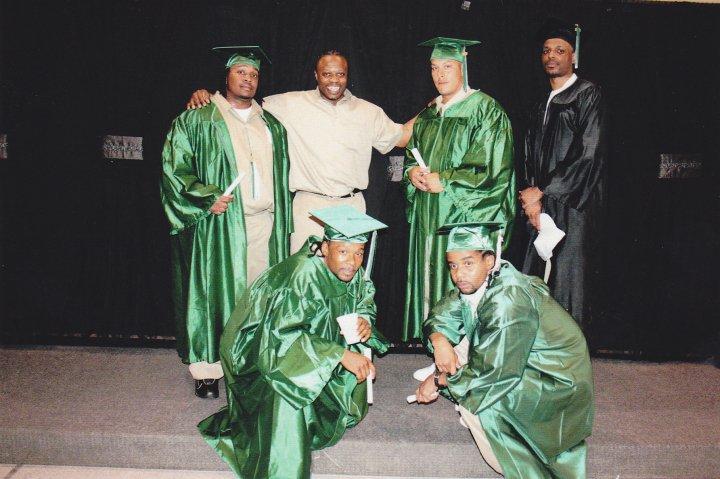Alice Marie Johnson is free. Now it’s time to free thousands more prisoners with unjustly long sentences.
Kim Kardashian’s successful campaign to free a 63-year-old grandmother serving a life sentence in a drug case is a reminder that we need to go big on clemency. A 52-year-old grandfather named Euka Wadlington, also doing life in a drug case, would be a great place to start.

I’m so glad that Alice Marie Johnson’s sentence was commuted and she was released from prison last week. No buts here. I’m just glad.
It’s fundamentally outrageous that any nonviolent first-time offender ever received a prison sentence of life without the possibility of parole. It’s gross. It’s excessive. It’s deeply inhumane.
It’s also very, very normal and very, very American.
Alice Marie Johnson is not an aberration or an exception. The United States became the incarceration nation—locking up more people than any country in the world—by doing some version of what it did to Johnson to hundreds of thousands people. Alice Marie Johnson happened to have fierce advocates and a viral video that caught the attention of Kim Kardashian, whose famous husband, Kanye West, just happened to profess his love for President Trump in the weeks before her sentence was commuted. Most men and women who are languishing for far too long in one of America’s nearly 2,000 prisons don’t have the serendipity of those circumstances.
No other developed nation sentences nonviolent offenders to life without the possibility of parole. In fact, most nations have even removed such harsh sentences for violent offenders. Indeed, if we’re really going to come to grips with mass incarceration we need to address sentencing for violent offenders as well. “The distinction between violent and nonviolent crime is not always meaningful,” Kevin Ring of Families Against Mandatory Minimums wrote recently. “Our federal sentencing laws are punitive, especially in a system without parole; ‘career offender’ is a scary term that doesn’t always fit.”
Long sentences, especially life sentences, can be a de facto death sentence without the lethal injection. Instead of strapping someone to a gurney and injecting them with poison, our nation aims to incarcerate some people until they die of disease or old age, well after they age out of committing crime. That such a sentence is not deemed cruel or unusual should tell you everything you need to know with what this nation has normalized.
In April 2014, when President Barack Obama’s administration announced a comprehensive clemency initiative for federal inmates, Attorney General Eric Holder stated that he expected at least 10,000 men and women would qualify. In the three years they had to administer the program, it was a slow, under-resourced mess in which 7,881 of the applications were never reviewed, and 8,880 people never received an answer at all.
To be granted clemency under the Obama initiative, prisoners had to meet the following six criteria:
- They are serving a federal sentence in prison and, by operation of law, most likely would have received a substantially lower sentence if convicted of the same offense(s) today.
- They are nonviolent, low-level offenders without significant ties to large-scale criminal organizations, gangs, or cartels.
- They have served at least 10 years of their sentence.
- They do not have a significant criminal history.
- They have demonstrated good conduct in prison.
- They have no history of violence before or during their current term of imprisonment.
Alice Marie Johnson, of course, met all six of those criteria and for some unknown reason the Obama administration didn’t commute her sentence. The same is no doubt true for thousands and thousands of other men and women.
I think I know at least part of what is at play here. Obama and his team, particularly at the Department of Justice, perhaps thought they were going to be passing the baton to a Hillary Clinton administration that would be keeping much of Obama’s DOJ team in place. Several families impacted by police brutality, particularly that of Eric Garner, told me that they received promises from Holder, Loretta Lynch, and even Obama himself that their federal cases would be closed before the end of his term. The family of Alton Sterling in Baton Rouge told me the very same thing. At first, the administration had a year left, then six months, then three – and it became clearer that the Obama administration had no intention of finishing those cases. Before she died, Erica Garner told me that DOJ officials told her that if they didn’t get to it, they would make sure the new team did.
Now Trump and Attorney General Jeff Sessions are at the helm of that new team.
While it’s a beautiful thing that Alice Marie Johnson’s sentence was commuted, Obama did so for 1,696 people. At his current pace, Trump might commute 10 sentences before his term is up. According to “The Mercy Lottery,” a new report from the Center on the Administration of Criminal Law at NYU Law School, approximately 36,000 people sentenced to federal prison sought clemency from Obama.
If Trump really wants to outdo Obama, this is his big chance. Recently Trump said he wants NFL players who took a knee in protest of racial injustice to submit names of the men and women they would like to see pardoned or get their sentences commuted.
Frankly, I don’t think we’re talking about a short list of names that needs to be submitted but instead perhaps tens of thousands of names. All the names can be submitted, of course, but Trump must fund and form a credible task force to work through each case much more efficiently than the Obama administration. While the task force can certainly lean on the criteria that Obama used, instead of requiring all six criteria be met for a sentence to be commuted, the group should consider requiring just some of them.
But even if the administration does stick to requiring all six guidelines, thousands and thousands men and women meet them and are simply waiting to receive clemency.
Emotionally, it’s easier for people in power to ignore numbers than it is for them to ignore names and stories. So when we say thousands of people deserve clemency, it has nowhere near the impact of saying their names, showing their photos, sharing videos, and making them completely human.
Alice Marie Johnson became human for millions of Americans when we saw a video of her telling her story behind bars. That story eventually gripped Kim Kardashian and she just so happened to have enough influence and access to share the story with Donald Trump. Just in case this is how we’re going to be forced to get commutations, I must tell you about a brilliant man named Euka Wadlington who should have been freed from prison many years ago.
It’s genuinely one of the most despicable stories of injustice I’ve ever heard. In 1998, unbeknownst to Wadlington, a former friend was working undercover for the Drug Enforcement Administration. For months, this man hounded Wadlington, a Chicago-area resident, asking him to sell drugs with him. For months, Wadlington told him no and that he had left that lifestyle behind. He had gotten a job in construction and had started a family.
Let me pause right there.
It’s gross that our government is in the business of sending former friends to vulnerable people to beg them to sell drugs. This is not real. It’s a fabricated scenario playing on the emotions and financial needs of a person. Eventually, Wadlington relented. He owed the man money from a previous car wash venture and decided he could potentially use the deal to repay the debt.
When Wadlington showed up at a hotel near Chicago’s Midway Airport for the drug deal, it was all a ruse set up by the federal government. He didn’t even have any drugs or guns when he was arrested. All he had was $1 in his wallet. But because he showed up for the fake deal, he committed a federal offense.
Wadlington’s trial in federal court during the spring of 1999 was equally unjust. Because he was never caught with any drugs, federal prosecutors relied entirely on the testimony of his alleged co-conspirators as well as others involved in the local drug scene to establish his guilt. Relying on such witnesses instead of concrete evidence like seized drugs seemed risky at first. One prosecution witness was so dishonest that Wadlington’s attorney asked him, in open court, “Do you make this up as you go along?” Another witness admitted on the stand that she lied when she told federal investigators that she had seen Wadlington package cocaine into resealable plastic bags.
But, I kid you not, when it was all over, a jury convicted Wadlington and a federal judge handed down two sentences of life without the possibility of parole.

For nearly 20 years, our federal government has spent millions of dollars keeping Wadlington, who is now 52, behind bars. He’s not had an incident report in his entire sentence in the federal Bureau of Prisons. Family members have died. Like Alice Marie Johnson, his kids have now had kids. And somehow, maintaining hope, Wadlington has used the time to better himself, accumulating dozens of awards and training certificates, including GED instructor and re-entry mentor.
Here we are with a man who was sentenced to life in federal prison in a drug case for not actually selling drugs, but for trying to.
The Obama administration should have granted Euka Wadlington clemency and set him free. But it did not. Here’s hoping that the Trump administration can right this wrong and, strange as it sounds, perhaps do for thousands of others what should have already been done.
